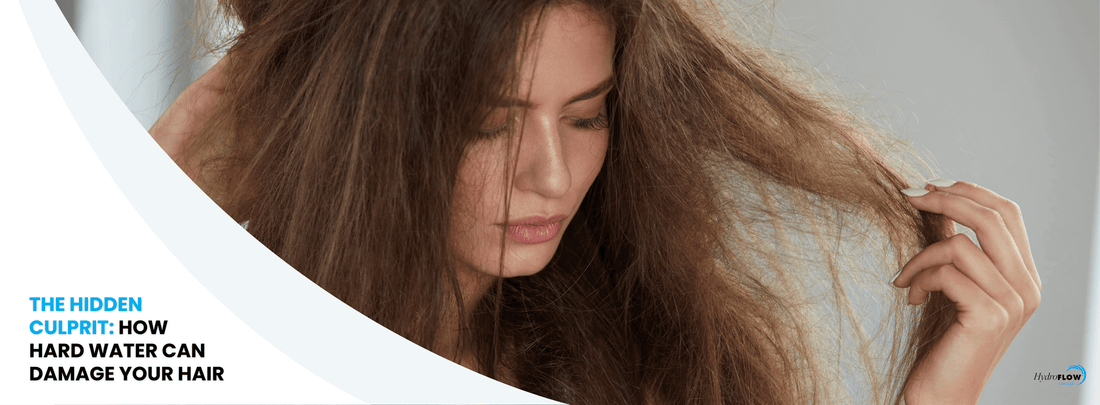Introduction
Lorsqu'on pense aux facteurs qui abîment nos cheveux, on pense souvent aux appareils chauffants, aux traitements chimiques et aux intempéries. Pourtant, il existe un ennemi discret qui passe souvent inaperçu : l'eau calcaire. L'eau calcaire, courante dans de nombreuses régions, peut, à terme, abîmer vos cheveux et entraîner une multitude de problèmes. Dans ce blog, nous explorerons les mécanismes scientifiques de l'eau calcaire, son impact sur vos cheveux et comment en atténuer les effets néfastes.
Comprendre l'eau dure
L'eau dure est une eau contenant une concentration élevée de minéraux dissous, principalement des ions calcium et magnésium. Ces minéraux sont absorbés par l'eau lors de son passage dans les roches et le sol souterrains. Si l'eau dure est généralement propre à la consommation, ses effets sur les cheveux peuvent être très néfastes.
L'impact de l'eau dure sur les cheveux
1. Accumulation de minéraux :
Lorsque l'eau dure entre en contact avec vos cheveux, elle laisse des dépôts minéraux. Ces dépôts peuvent s'accumuler avec le temps, formant une couche sur la tige capillaire. Cette accumulation peut rendre vos cheveux lourds et ternes.
2. Sécheresse et frisottis :
Les minéraux contenus dans l'eau dure peuvent priver vos cheveux de leurs huiles naturelles. Cette perte d'hydratation peut entraîner des cheveux secs et crépus, difficiles à coiffer. Les cheveux secs sont plus sujets aux cassures et aux fourches.
3. Matité :
L'eau dure peut faire perdre à vos cheveux leur éclat naturel. À mesure que les dépôts minéraux s'accumulent, ils forment une barrière qui réfléchit moins la lumière, laissant vos cheveux ternes.
4. Décoloration :
Si vous colorez vos cheveux, l'eau calcaire peut accélérer leur décoloration. Les minéraux peuvent décaper les molécules colorantes de vos cheveux, rendant votre couleur terne et irrégulière.
5. Mousse réduite :
L'eau dure rend difficile la création d'une mousse riche avec le shampoing et le savon. Vous risquez alors d'utiliser davantage de produits, ce qui peut entraîner une accumulation de produits sur vos cheveux et votre cuir chevelu.
6. Problèmes de cuir chevelu :
Les minéraux présents dans l'eau dure peuvent également affecter votre cuir chevelu. Ils peuvent provoquer sécheresse, démangeaisons et desquamation, aggravant potentiellement des problèmes comme les pellicules et l'eczéma.
7. Cassure des cheveux :
Les tiges capillaires affaiblies par l’accumulation de minéraux peuvent rendre vos cheveux plus sensibles à la casse et à la perte de cheveux.
Atténuer les effets de l'eau dure sur les cheveux
1. Utilisez un adoucisseur d’eau :
Installation d'un adoucisseur d'eau L'utilisation d'un système de purification d'eau domestique peut contribuer à réduire la dureté de l'eau. Ces systèmes fonctionnent en échangeant des ions calcium et magnésium avec des ions sodium, adoucissant ainsi efficacement l'eau.
2. Shampooing clarifiant :
Utilisez un shampooing clarifiant une fois par semaine pour éliminer les dépôts minéraux de vos cheveux. Ces shampooings sont formulés pour éliminer et rincer les dépôts tenaces.
3. Shampooing chélateur :
Pensez à utiliser occasionnellement un shampoing chélateur. Ces shampoings contiennent des ingrédients plus puissants qui peuvent éliminer les dépôts minéraux les plus tenaces de vos cheveux.
4. Rinçage au vinaigre :
Un rinçage occasionnel au vinaigre peut aider à éliminer les dépôts minéraux et à redonner de l'éclat à vos cheveux. Mélangez une part de vinaigre avec trois parts d'eau et utilisez-le comme rinçage final après le shampoing.
5. Filtres à eau :
Investissez dans un filtre de pommeau de douche conçu pour éliminer les minéraux de l’eau avant qu’elle n’entre en contact avec vos cheveux et votre peau.
6. Styles de protection :
Pensez à porter des coiffures protectrices comme des tresses ou des chignons pour minimiser l’exposition à l’eau dure.
7.Conditionnement en profondeur :
Appliquez régulièrement un soin en profondeur sur vos cheveux pour lutter contre la sécheresse et restaurer leur hydratation.


